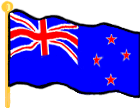Pōkarekare Ana
Pōkarekare Ana
The Waters of Lake Rotorua
Traditional Song
Traditional Song
(Maori)
(English)
Pōkarekare ana ngā wai o Rotorua,
Whiti atu koe hine marino ana e.
(Chorus)
E hine e hoki mai ra.
Ka mate a au ki te aroha e.
Tuhituhi taku reta tuku atu taku rīngi,
Kia kite tō iwi raru raru ana e.
Whati whati taku pene ka pau aku pepa,
Ko taku aroha mau tonu ana e.
E kore te aroha e maroke i te rā,
Mākūkū tonu i aku roimata e.
The waters of Rotorua Lake are stormy*,
But they will calm down when you cross over them.
(Chorus)
Oh my beloved return to me,
I'm dying of sorrow.
I have written letters and have given my number**,
So that your people can see that I am troubled.
My pen is worn out and I have no more paper,
But still my sorrow is unending.
My grief will never be dried up by the sun,
My tears will keep flowing.
Notes
* The title to the song should literally be "They are rough".
**Literally 'telephone' - Denis explains: "She'd given her phone number and was waiting to be called… my opinion is that this verse must have been added later to the original version."
*****
Here's a shorter version as translated by Jude Devantier:
Pōkarekare ana
(Maori)
Pōkarekare ana
ngā wai o Rotorua,
Whiti atu koe hine
marino ana e.
E hine e
hoki mai ra,
Ka mate au i
te aroha e.
Hurry Back to Rotorua
(English Translation)
Hurry hurry hurry
Hurry back to Rotorua
To the mountains and the valleys
Hurry home to me.
I know I know
You had to go
Please hurry back home love
Hurry home to me.
*****
Denis Ferrand, who sent us the longer version of the song and a French translation, wrote: "My version of the story was told to me by people of Marae PIKIRANGI in Rotorua, we were greeted at the 1st Festival of Pacific Arts in 1976 in which I participated as an actor . I was part of the Polynesian delegation and I know the Maori language, my first language, and various Polynesian dialects, which include the Maori of NZ.
The history of the song:
A young man from a tribe of northern New Zealand arrived one day in Rotorua. He met a girl and they became lovers. But one day he returned to his family, called back by his tribe to be enrolled in the New Zealand Expeditionary Force that participated in the 1914-1918 war alongside England. He never returned. All letters that the young girl wrote to her beloved unfortunately remained unanswered...
So the girl stayed in Rotorua, sang of her grief and begged him to return.
It's all this pain that the girl expresses in her song, a sublime song that glorifies the melancholy poetry of Polynesian peoples.
Here are Linguistic explanations of words:
Breaking down "Pokarekare":
- The root word is 'ARE meaning "WAVE"
- The root is doubled: 'ARE'ARE or Karekare
- The prefix PO gives the idea of a dark scene, terrifying ...
So if we sum it up, "Pokarekare" refers to a body of water, there are waves, and that's scary. The sailors say "stormy seas" (the storm).
E hine e:
Darling (darling, my darling)
Breaking down "hoki mai ra":
hoki -> return (a single word to leave and return, the difference is with "mai" and "atu"
mai -> indicates movement towards the place where the speaker stands (atu -> movement away from him/her)
ra -> introduces an idea of impatience and supplication (as in: that's enough now, I've endured enough ... etc.)
Putting it all together, word for word it gives, "Return here I beg you,"
Breaking down "ka mate has to":
mate -> death
to -> me
ka ... has ...-> expresses an action that is taking place (death) and that affects a person (me), thus: I'm dying...
Breaking down "ki te aroha e":
In the center is the word "aroha" used here for "mercy" compassion. The idea is to convey: "I feel great compassion, so intense, it kills me."
The phrase "ka mate has the aroha ki te e" is classic Polynesian poetry, it means, "I am dying of grief", not "I am dying of love for you". You can die of love for someone, it does not necessarily mean that the beloved is departed... Here it is the absence of the loved one that plunges us in pain...
Let us summarize now the refrain:
- Darling, (my darling, my darling)
- Return to here I beg you
- I am dying
- of compassion
I think my translation:
"Come back my beloved, I am dying of grief" sums up the spirit.
Another equally valid option in my opinion:
"Darling, come back quickly, my grief is so intense that it's killing me."
You see it is far from word for word.
What is important is the idea, the feeling we want to get across, and it's difficult to do with a dictionary, because a word can have several meanings depending on the context in which it is used, and the literal translation may mislead us. "
*****

Comments
According to Kelty, this is "probably the MOST famous of New Zealand songs sung by children (mostly in Maori)."
Jude says this is... "a New Zealand song originally sung by the Maori people, they were in NZ before the pakeha (white people) arrived but there is little distinction between us, and true blood Maori have joined the big melting pot that is NZ today.
Thanks and Acknowledgements
Many thanks to Jude Devantier and Kelty McClennan for contributing this song, and to Jude for translating it. Thanks also to Maori Images for permission to use the Maori divider images.
Thanks to Denis Ferrand for the longer version of the song, the French translation and interesting commentary.
1st English translation by Lisa Yannucci and Monique Palomares based on Denis Ferrand's French translation.
Ka pai!
























